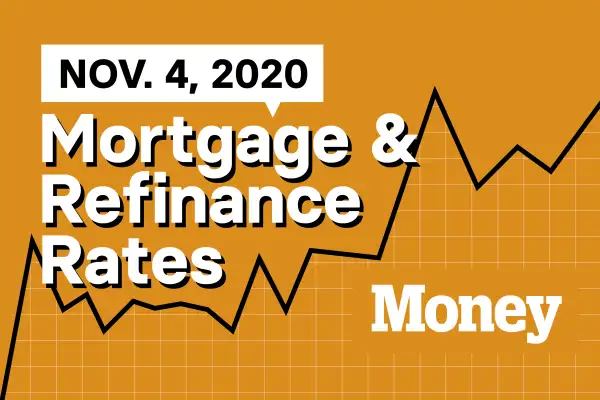Here Are Today's Best Mortgage & Refinance Rates for November 4, 2020

The average rate for a 30-year fixed-rate purchase mortgage was 3.538% on Tuesday. The average rate for a 30-year refinance was 4.284%.
Money's current mortgage rates include data from over 8,000 lenders across the United States and are updated daily. These rates include discount points and represent what a borrower with a 20% down payment and 700 credit scores — roughly the national average FICO score — would have been quoted.
| 30-year fixed-rate purchase mortgage |
| 3.538% |
| Rate of November 3, 2020 |
Mortgage rates vary from state to state. On Tuesday, borrowers in Illinois were quoted the lowest mortgage rates — at 3.318%. People looking for mortgages in Nevada saw the highest average rate at 3.776%. Nationwide, borrowers with the highest credit scores, 740 and above, were quoted rates averaging 3.054%, while those with credit of 640 or below were shown rates of 4.661% — a 1.607 percentage-point spread.
You may be able to negotiate a lower rate if you shop around or if you have other accounts with the lender. (Money's picks for the best mortgage lenders are here.) Currently, some banks are hiking up advertised rates to keep demand in check, so you may be offered a lower rate if you reach out directly.
Freddie Mac's widely quoted Primary Mortgage Market Survey put rates at 2.81% with 0.6 points paid for the week ending October 29. The mortgage purchaser's weekly survey reflects borrowers who put 20% down on conforming loans and have excellent credit.
Refinance rates today
Money's survey also shows that the offered rate for a 30-year refinance for someone with a 740 credit score was 3.736% on Tuesday. Last November, the average mortgage rate (including fees) was 3.874%.
| 30-year fixed-rate mortgage refi |
| 3.736% |
| Rate of November 3, 2020 |
A homeowner with a $200,000 mortgage balance currently paying 3.874% on a 30-year could potentially cut their monthly payment from $940 to $925 by financing at the current lower rates. To determine if it's worth it to refinance your mortgage, also consider the closing fees you paid on your current mortgage, how much your new lender is charging and how long you have left on your loan term. (Our picks for the best lenders for refinancing are here).
What else is happening in the housing market right now?
The third quarter of 2020 is on track to break records in terms of purchase, refinance, and total mortgage loan origination volumes, according to Black Knight's Mortgage Monitor Report. The data, based on 45 day lock-to-close periods, indicates that refinance and overall loan originations could be at least 25% higher than in the previous quarter, while purchase loan originations could be up by at least 35%.
If this trend holds, 2020 could bring new records in refinance lending, while purchase loans could reach the highest level since 2005. As it stands, total annual mortgage lending is on pace to surpass the $4 trillion mark for the first time ever.
“Rate lock data from Black Knight’s Compass Analytics division shows that Q3 2020 mortgage originations are on track to break quarterly records across the board and remain strong moving into Q4,” said Ben Graboske, president of Black Knight Data & Analytics. “This suggests that origination and prepayment activity will likely remain elevated well into Q4 2020. September lock activity held relatively level with August, but through October 19, lock activity overall is up 4% from the month prior — with purchase locks up 6% and refinance locks up 3% thus far. Interest rates setting new record lows in mid- and late October will likely continue to fuel lock activity in coming weeks."
Record low mortgage rates, tight housing supply, and high buyer demand continue to put upward pressure on home prices. Year-over-year, median home price growth accelerated from 11.5% in August to a record high of 14.2% in September. For comparison, home price growth was 0% for the month of May.
Meanwhile, data from the Mortgage Bankers Association, showed the total volume of mortgage loan applications increased by a seasonally adjusted 3.8% for the week ending October 30. The week-over-week uptick was led by an increase in the number of refinance loan applications, which was up by 6% and made up nearly 69% of all loan activity. Year-over-year, refinance loans were 88% higher than the same week last year.
Purchase loans ticked down for the fifth time in the last six weeks, declining 1% from the previous week. Despite the slight drop, purchase applications were still 25% higher than last year, marking the sixth straight month of year-over-year gains.
Quote of the Week
Don't be shocked when your credit score drops like a stone," says Howard Dvorkin, chairman of Debt.com, on how your credit score is affected when you get a mortgage. "After all, you just took on a lot of new debt."
For more on mortgage loans and your personal finances, read: 5 Ways Your Finances Instantly Change When You Buy a House.
Bottom line:
Savvy Homebuyers Are Using an Under-the-Radar Strategy to Win Bidding Wars in 2020
New Construction Home Sales Are Soaring, but Financing a Purchase Can Be Tricky
Rates are subject to change. All information provided here is accurate as of the publish date.
